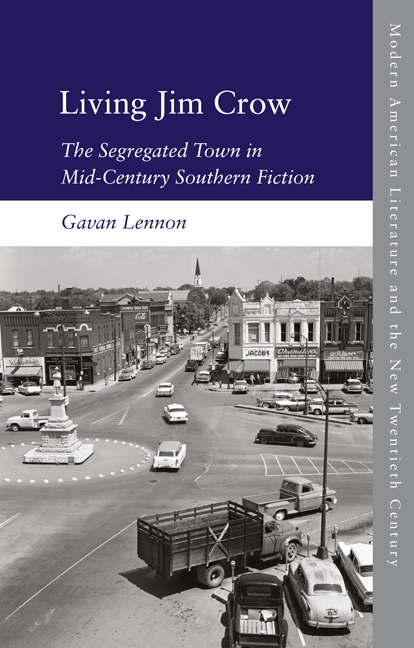Book contents
- Frontmatter
- Contents
- Acknowledgements
- Introduction: Uncovering a Poetics of Protest
- 1 Creators of the Small Town: Anthropology, Racial Etiquette and African American Fiction in the 1930s
- 2 The White Town/Coloured Town Paradigm: Lillian Smith’s Maxwell
- 3 An Anatomy of Critique: Byron Herbert Reece’s Tilden
- 4 The Milan Cycle: Carson McCullers’s Milan
- 5 Breaking the Pencil: William Faulkner’s Jefferson
- 6 Knowing How to Curse: William Melvin Kelley’s Sutton
- Conclusion: (De)Generative Ground – The Field and the Segregated Town
- Notes
- Bibliography
- Index
1 - Creators of the Small Town: Anthropology, Racial Etiquette and African American Fiction in the 1930s
Published online by Cambridge University Press: 15 October 2020
- Frontmatter
- Contents
- Acknowledgements
- Introduction: Uncovering a Poetics of Protest
- 1 Creators of the Small Town: Anthropology, Racial Etiquette and African American Fiction in the 1930s
- 2 The White Town/Coloured Town Paradigm: Lillian Smith’s Maxwell
- 3 An Anatomy of Critique: Byron Herbert Reece’s Tilden
- 4 The Milan Cycle: Carson McCullers’s Milan
- 5 Breaking the Pencil: William Faulkner’s Jefferson
- 6 Knowing How to Curse: William Melvin Kelley’s Sutton
- Conclusion: (De)Generative Ground – The Field and the Segregated Town
- Notes
- Bibliography
- Index
Summary
Robert Penn Warren regretted writing ‘The Briar Patch’, his contribution to the southern agrarians’ manifesto I’ll Take my Stand (1930). As the poet, novelist and critic's politics developed through the middle decades of the twentieth century, he shifted from the implicitly white supremacist, reactionary ideology of the agrarians towards racial liberalism. By the 1950s, and the publication of Segregation: The Inner Conflict of the South (1956), Warren offered an intellectual contribution to civil rights activism. His collection of interviews with civil rights activists, Who Speaks for the Negro? (1965), included a frank rejection of the earlier essay: ‘… even then, thirty-five years ago, I uncomfortably suspected […] that no segregation was, in the end, humane. But it never crossed my mind that anybody could do anything about it.’ Nevertheless, when the younger Warren, the reactionary agrarian, declared that ‘The Southern Negro has always been a creature of the small town and farm. That is where he still chiefly belongs, by temperament and capacity’, he was describing two complementary, if inadvertent, fictions. The first fiction positions the small southern town as an archetype: a discrete, representative unit of community and space. The figure of the town that Warren constructs stands as an integer that is at once recognisable and resistant to specificity. The second fiction relates to the system of racial etiquette through which such towns operated. Warren implies that this system of ‘appropriate behaviour’ is both a natural offshoot of African Americans’ essentialist ‘temperament and capacity’, and that it is beneficial, contributing to a sense of ‘belonging’. But southern towns were not stable integers awaiting objective study; nor was racial etiquette either natural or beneficial.
Warren was not unique among his contemporary intellectuals. The 1930s saw a crystallisation of these two narratives, as put forward in discourses from both the social sciences and the humanities. The former thrived through an unprecedented turning inward of American anthropology and ethnography: pivotal works by John Dollard, Helen Merrell Lynd and Robert Staughton Lynd, and Hortense Powdermaker invented fictions of the typical American and southern towns.
- Type
- Chapter
- Information
- Living Jim CrowThe Segregated Town in Mid-Century Southern Fiction, pp. 21 - 48Publisher: Edinburgh University PressPrint publication year: 2020



